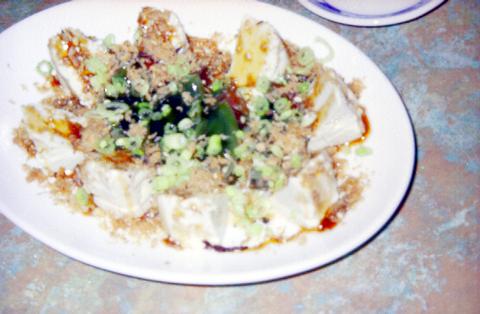Dai's House of Stinky Tofu has another name in Chinese -- House of Unique Stink. It may sound funny to foreigners who are loathe to try the unique dish, but after visiting Dai's, one may find that stinky tofu really doesn't taste as bad as it smells.
Almost every dish at Dai's is made using stinky tofu. There are the typical tofus; steamed, stir-fried, and grilled, but Dai's is the only place in the world, according to owner Wu Hsu Pi-ying (
Decades ago, stinky tofu was a military staple for soldiers patrolling China's borders. But as Taiwan's night-market culture developed, so did stronger, spicier and more diverse flavors of stinky tofu.

PHOTO: YU SEN-LUN
Unlike most night-market stinky tofu stands where the odor permeates the air, Dai's house is simply a clean, ordinary restaurant with a huge Crouching Tiger poster on the wall.
Film director Lee Ang (
The somewhat freaky cold stinky tofu (涼拌臭豆腐) is actually quite refreshing -- similar to, but milder than blue cheese. With its soft and dense texture, it's served with shredded scallions in a light soy sauce and is recommended as a starter.
The raw tofu adds a new line to Dai's 50-year-old menu and is, according to Wu, the healthiest way to try stinky tofu.
In some places, you really don't want to know how the tofu is made, said Wu. Long ago, some used rotting seafood to ferment the bean curd while others used chemicals. But Dai's products are all vegetarian, using amaranth, mustard leaf, bamboo shoots and more than 10 kinds of Chinese herbs to ferment the bean curd for six months, said Wu.
Pure vegetarianism has turned Dai's stinky tofu into something of an urban legend. Seven years ago, Tsinghua University's (
Fried stinky tofu is the least pungent and therefore more suitable for first-timers. The fried tofu of the house (招牌炸) is Dai's flagship dish and has extra-crispy skin and smooth tofu inside. Try mixing the four sauces into your own blend: soy sauce, garlic and radish pastes and chili sauce.
For solo visitors, the tofu fried noodles with spicy and sour sauce (

Towering high above Taiwan’s capital city at 508 meters, Taipei 101 dominates the skyline. The earthquake-proof skyscraper of steel and glass has captured the imagination of professional rock climber Alex Honnold for more than a decade. Tomorrow morning, he will climb it in his signature free solo style — without ropes or protective equipment. And Netflix will broadcast it — live. The event’s announcement has drawn both excitement and trepidation, as well as some concerns over the ethical implications of attempting such a high-risk endeavor on live broadcast. Many have questioned Honnold’s desire to continues his free-solo climbs now that he’s a

As Taiwan’s second most populous city, Taichung looms large in the electoral map. Taiwanese political commentators describe it — along with neighboring Changhua County — as Taiwan’s “swing states” (搖擺州), which is a curious direct borrowing from American election terminology. In the early post-Martial Law era, Taichung was referred to as a “desert of democracy” because while the Democratic Progressive Party (DPP) was winning elections in the north and south, Taichung remained staunchly loyal to the Chinese Nationalist Party (KMT). That changed over time, but in both Changhua and Taichung, the DPP still suffers from a “one-term curse,” with the

Jan. 26 to Feb. 1 Nearly 90 years after it was last recorded, the Basay language was taught in a classroom for the first time in September last year. Over the following three months, students learned its sounds along with the customs and folktales of the Ketagalan people, who once spoke it across northern Taiwan. Although each Ketagalan settlement had its own language, Basay functioned as a common trade language. By the late 19th century, it had largely fallen out of daily use as speakers shifted to Hoklo (commonly known as Taiwanese), surviving only in fragments remembered by the elderly. In

William Liu (劉家君) moved to Kaohsiung from Nantou to live with his boyfriend Reg Hong (洪嘉佑). “In Nantou, people do not support gay rights at all and never even talk about it. Living here made me optimistic and made me realize how much I can express myself,” Liu tells the Taipei Times. Hong and his friend Cony Hsieh (謝昀希) are both active in several LGBT groups and organizations in Kaohsiung. They were among the people behind the city’s 16th Pride event in November last year, which gathered over 35,000 people. Along with others, they clearly see Kaohsiung as the nexus of LGBT rights.